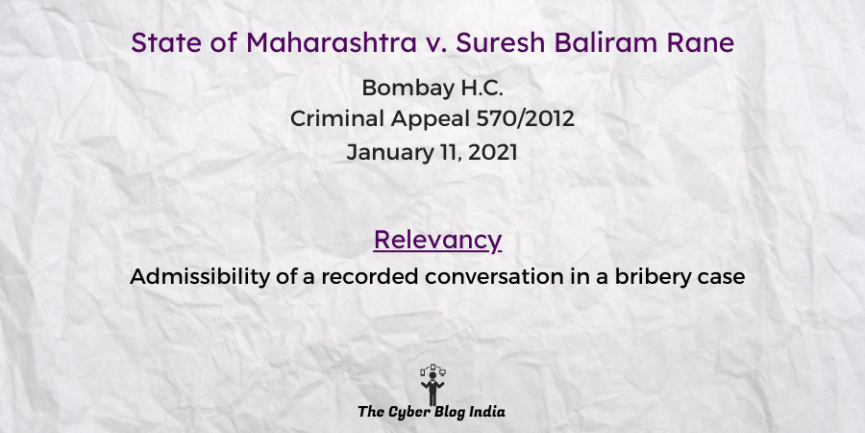State of Maharashtra v. Suresh Baliram Rane

State of Maharashtra v. Suresh Baliram Rane
(2021) 1 Bom CR (Cri) 684
In the High Court of Bombay
Criminal Appeal 570/2012
Before Justice Sandeep K Shinde
Decided on January 11, 2021
Relevancy of the case: Admissibility of a recorded conversation in a bribery case
Statutes and Provisions Involved
- The Information Technology Act, 2000 (Section 2(1)(f))
- The Evidence Act, 1972 (Section 65B)
- The Criminal Procedure Code, 1973 (Section 378)
- The Prevention of Corruption Act, 1988 (Section 7, 13)
Relevant Facts of the Case
- The complainant has alleged that the respondent took a bribe for measuring his land on priority.
- The complainant called the respondent on his mobile phone from the Anti-Corruption Office and recorded the conversation. Subsequently, the raiding team and the complainant went to the respondent’s office.
- Further, the conversation at the respondent’s office was recorded using a voice recorder device.
- The complainant paid ₹4000 coated with the anthracin powder to the respondent. Afterwards, the raiding team recovered the currency and arrested the respondent.
- The investigation agency stored these conversations on two CDs. It further prepared transcript verification panchnamas and sent the discs to the forensic laboratory for spectrographic tests. Importantly, the prosecution has relied on this evidence for proving its case
- However, the trial court acquitted the respondent because of a lack of evidence. The state has filed an appeal against this order.
Opinion of the Bench
- Voice recordings stored on Compact Disc (CD) is an electronic record under Section 2(1)(f) of the Information Technology Act, 2000. Therefore, it is secondary evidence.
- Also, the admissibility of electronic evidence requires a certificate under Section 65B of the Evidence Act, 1872.
- The court found that there is a possibility that the complainant has not disclosed the significant conversation that happened in the respondent’s office. Moreover, the telephonic conversation does not suggest anything on the demand of any amount by the respondent.
- There should be a demand and voluntary acceptance of the amount to prove the offence of bribery. However, the prosecution has failed to prove the demand of any amount by the respondent.
Final Decision
- As a result, the court dismissed the state’s appeal.
